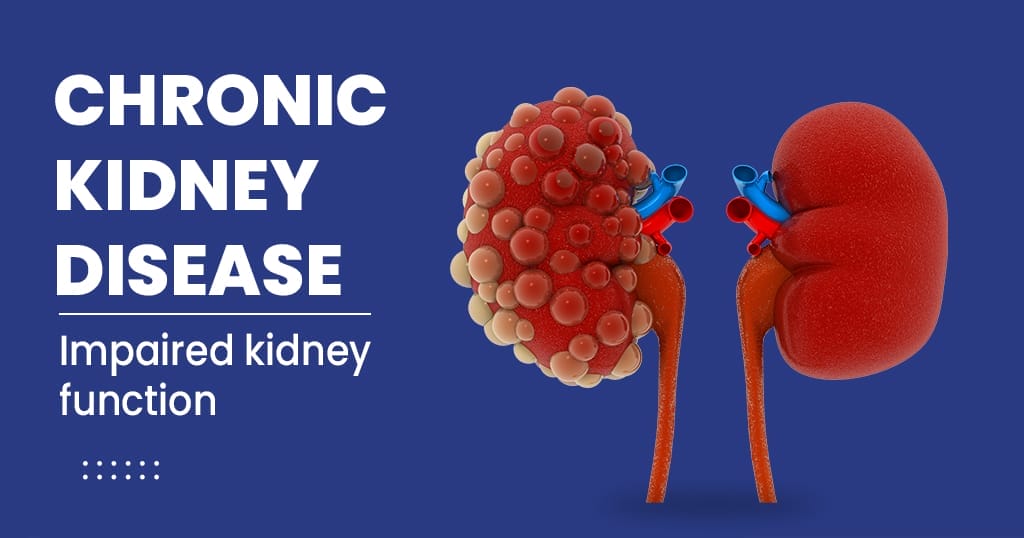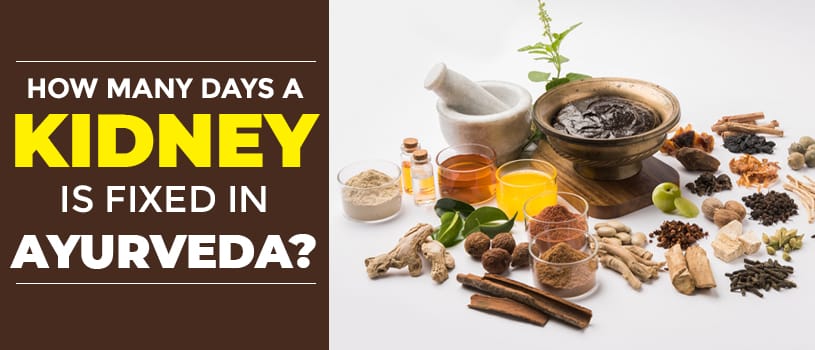What is Chronic Kidney Disease?
Kidney play a significant part in homeostasis by keeping up with the detoxifying of the body through the course of blood filtration. The system of blood filtration is related to urine production, disposal and reabsorption.
Chronic kidney disease is stated as a severe kidney disorder that is renal harming and progressive. In CKD, the kidneys will generally lose their function slowly over months or even a long time. It is an exemplification of outrageous results as it has complex pathology.
Persistent kidney disease represents the extreme cases and influences the CKD patient’s psychological, physical, and financial state. However, a comprehensive arrangement is accessible for the seriousness of chronic kidney disease, and it is through CKD treatment in Ayurveda.
Chronic kidney disease is characterized as a horde of a few pathophysiological components that intrudes with the functioning of kidneys and progressively takes them to the stage of malfunction. Although the two driving reasons for chronic kidney disease are diabetes and hypertension, a few harmless or extreme ailments and sickness lead to the weakening of kidney function, which is grouping the phases of chronic kidney disease.

Chronic kidney disease is expressed as the presence of renal damage caused by improper blood filtration. When the kidneys secure damage in the filtering units, a series of issues emerge and influence other body parts. Nonetheless, persistent kidney disease influences GFR as the glomerular filtration rate enlightens us regarding the functional rate of kidneys. If there is any glomerular damage, that implies the kidneys aren’t sifting the blood as indicated by actual necessities.
- Stage one: Normal GFR> 90 mL/min per 1.73 m2 and dependable albuminuria.
- Stage two: eGFR between 60-99 mL/per 1.73 m2.
- Stage three: eGFR between 30-59 mL/min per 1.73 m2.
- Stage four: eGFR between 15-29 mL/min per 1.73 m2.
- Stage five: eGFR OF <15 mL/min per 1.73 m2 or ESRD (end-stage renal sickness).
The above stages portray how chronic kidney disease caused a steady loss of nephrons which advanced to end-stage renal disease (kidney failure). The pace of kidneys’ working can be assessed by estimating GFR. In the above progressive stages, the kidneys’ GFR rate is reduced. Nonetheless, this is the way kidneys arrive at the phase of kidney failure.
CKD treatment in Ayurveda is the best answer for the upgrade of kidneys’ function. The natural recuperating arrangement of Ayurveda stops the advancement of CKD and maintains the kidneys’ good health and vitality.
What manifestations emerge because of chronic kidney disease?
The disturbing indication of chronic kidney disease is that it doesn’t grandstand its manifestations in the underlying stages. When kidneys are unable to do blood filtration and the duties are hampered, explicit issues are set off, resulting in underlying symptoms.
These symptoms of chronic kidney disease are as follows:
- Queasiness or vomiting.
- Loss of craving or not feeling hungry more often.
- Weakness or unnecessary exhaustion.
- Sleep deprivation or sleep-related issues.
- Muscle twitches and cramps.
- Because of fluid retention, swelling takes place in the feet, ankles and legs, making the abundance of liquids gather in the tissues.
- Tingling sensation or itching.
- Changes in the urine output.
- Diminished mental sharpness (Confusion or unable to focus/unfit to think).
- Chest pain, if liquid gathers around the boundary of the heart.
- Asthma-like breathing (windedness) if liquids gather inside the lungs.
- High blood pressure or hypertension is one more duty of kidneys that can not be fulfilled due to kidneys’ function.
CKD treatment in Ayurveda helps reduce the severity and progression of chronic kidney disease using herbal medications that heal the kidneys’ functioning.

Understanding the causative factors of chronic kidney disease
Causes are the establishment of renal damage and can trigger the scene of chronic kidney disease. The reasons for kidney diseases vary from one another, yet they all have a similar goal: to lead the kidneys towards end-stage renal disease. They are related to renal harming properties and provide irreparable damage to the filtering units of the kidneys.
Notwithstanding, CKD treatment in Ayurveda expresses that it is crucial to detect the central condition before dealing with the building blocks of chronic kidney disease.
The causes of chronic kidney disease are mentioned below:
- Diabetes: Elevation in glucose is the essential explanation for hampered kidney function. As diabetes can impact the functioning rate of kidney work, causing the kidneys to lose their sifting capacities after some time. A series of issues show up and form up into chronic kidney disease.
- Glomerulonephritis: This condition is related to the glomerulus. Glomerulonephritis can cause the aggravation of tiny blood filtering vessels in the kidneys.
- Interstitial Nephritis: It is related to one of the filtering agents of the kidneys tubules. These reabsorbing tubes reestablish the fundamental substances into the circulation system. However, Nephritis can cause the inflammation of tubules, making them work abnormally.
- Hypertension: Increase in blood pressure levels can hamper the kidneys’ filtering system as hypertension can debilitate the arteries surrounding the kidneys.
- Polycystic kidney Disease: PKD is an inherited kidney disorder that can hamper the structure and function of the kidneys by forming cysts.
- Vesicoureteral reflux: This condition makes the urine back up in the kidneys.
- Kidney disease – Pyelonephritis.
Can chronic kidney disease create any complications?
The truth is that chronic kidney disease is a severe kidney illness and can cause serious difficulties. These difficulties increase the rate of chronic kidney disease:
- Gout: Kidney disease patients can encounter the issue of gout most generally. In this way, gout can occur in the incidence of kidney disease. Since kidneys are answerable for the filtration of uric acid, the two illnesses are related to one another.
- Iron deficiency: One of the duties of kidneys is to help the body structure red platelets for the body. When kidneys don’t work typically, the body can not shape adequate red blood cells; This condition is anaemia.
- Metabolic acidosis: Metabolic acidosis is depicted as an accumulation of acid in the body. The kidney keeps up with the acid balance of the body. When kidneys enter the period of impairment, they can not filter the blood as needed.
- Hyperphosphatemia: The body needs calcium in vitamin D for the magnificent strength of bones; healthy kidneys support bones’ wellbeing. Being a CKD patient, one can experience bone disease and elevation in phosphorus.
- Hyperkalemia: If you have CKD, the kidney won’t filter the excess levels of potassium.
- Build-ups of waste products and excess fluids: Blood filtration is the kidneys’ chief function to improve the human body. Their entire framework handles the separation of waste products present in the blood. The course of blood filtration follows the deliberate order- Filter-Reabsorb-Eliminate.

When blood travels through the kidneys to be separated, the small blood filtering vessels known as glomeruli channel the blood and don’t allow fundamental substances to stream out of their filters. These tiny blood vessels are a fundamental piece of filtering units of the kidneys. Tubules can reabsorb the fundamental substances back into the circulation system.
Not with standing, the waste products are moved into the bladder to be discharged out of the body. Yet, a strike of CKD can trigger poor blood filtration because of the waste products and excess fluids in the blood. These deposits can welcome a few issues, like hypertension and oedema.
What fomenting factors can build the danger of chronic kidney disease?
Certain elements can expand your danger of obtaining damage inside the primary units of the kidneys. Notwithstanding, these are the risk factors connected to chronic kidney disease.
- Cardiovascular disease
- Smoking
- Weight
- Having a family background of kidney illness
- Abnormal structure of the kidney
- Old age
- Diabetes
- Hypertension
How many days does a kidney take to be fixed in Ayurveda?
CKD treatment in Ayurveda comprehends the pathology of the disease and works in the betterment of kidney function. The natural healing system of Ayurveda centres around balancing the vitiated doshas (Vata, pitta and Kapha). The mitigation of CKD should, in any case, be possible through the therapeutic study of Ayurveda. The kidney illness can be expressed as a mootra dosha which midway causes oedema. Both of the kidneys are the foundations of medovaha srotas.
The beginning of chronic kidney disease is detected in some conditions such as Prameha, mutradosha, Mutra krich chro, Injury of vankshana, swelling and ashmari (kidney stones). That is the reason chronic kidney disease is an intricate illness.

Notwithstanding, the complete methodology of CKD treatment in Ayurveda can help in the administration of the disease. The herbal medications can recuperate the damage of the kidneys and improve the filtering capacities. Natural healing therapies are also an efficient part of the treatment. These treatments are productive and certainly affect the body. In India, Ayurveda treatment for CKD kidney sickness healthify the CKD patient’s diet (ahar) and way of life (vihar). The body of an individual with CKD is the focal point of medical problems that can be overseen through a healthy eating routine and way of life. The CKD diet incorporates superfoods that upgrade kidney function and don’t hamper different parts of the body. Yoga is additionally suggested as it can assist with keeping up with the harmony between the body, mind and soul.
The Bottom Line
With the developing number of CKD cases and keeping the financial weight on the patient, Ayurveda provides affordability to the CKD patients. Ayurveda therapy for chronic kidney disease can heal the kidney. The period in which a kidney can heal completely depends on how much the disease has spread in the kidney; system. If the disease has caused a lot of damage, then the herbal medications will heal them with time. However, some people acquire kidneys’ retrieval speedily because of their natural healing capabilities. However, the kidneys’ state from being unhealthy to a healthy one depends on the progression of the disease and the patient’s age. If the patient is elderly, his body will take time to heal and adapt to the treatment. At the same time, people with a sound immune system and young age can have a speedy recovery. There is no time limit in ayurvedic treatment, but there is a guarantee that CKD treatment in Ayurveda is effective and permanently treats kidney disease from its core.
Disclaimer: This information given on this page is expected for knowledge purposes only. It should not be taken as a substitute for medical advice without speaking with any ayurvedic specialist.

